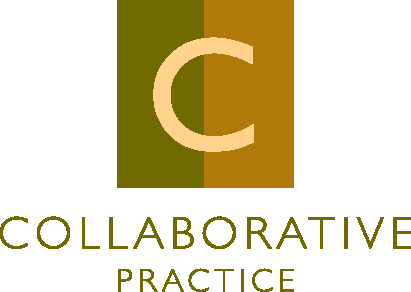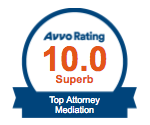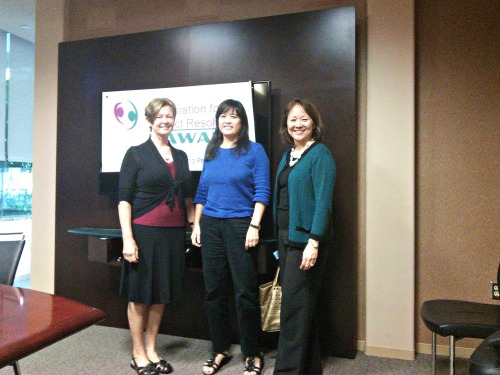- What is Collaborative Divorce?
- How is Collaborative Divorce different from traditional adversarial divorce processes?
- How is Collaborative Divorce different from mediation?
- What are the roles of the Collaboratively-Trained Attorneys in Collaborative Divorces?
- What are the roles of the Interdisciplinary Collaboratively-Trained Team Members in Collaborative Divorces?
- What information is disclosed in Collaborative Divorces?
- Why is Collaborative Divorce such an effective settlement process?
- How long does a Collaborative Divorce take to complete?
- How much does a Collaborative Divorce cost?
- How do I enlist my spouse in the Collaborative Divorce process?
- How do I know if Collaborative Divorce is the right choice for me?
- What other resources are out there for me to check out?
- How do I get started?
1. What is Collaborative Divorce?
Collaborative Divorce is a process for couples whereby each of them retains a specially trained attorney to assist them in reaching an out-of-court agreement that meets the needs and interests of the entire family. The couple and their attorneys commit and pledge to resolve the issues privately and confidentially and without the threat of litigation. This is achieved by everyone agreeing to work together respectfully, transparently, and in good faith to find mutually acceptable solutions that addresses the needs and interests of everyone in the family.
Directly below: In this video, I describe some of the basics about Collaborative Divorce.
2. How is Collaborative Divorce different from traditional adversarial divorce processes?
The difference between Collaborative Divorce and traditional, adversarial divorce processes is vast. Traditional, adversarial divorce processes, unfortunately, are part of a system which often intensifies conflict between divorcing couples. The conflict inherent in divorce litigation can take an emotional and financial toll on the parties and their children. By contrast, Collaborative Divorce professionals are trained to help you and your spouse reach mutually acceptable agreements and avoid court battles.
3. How is Collaborative Divorce different from mediation?
In Divorce Mediation, neutral professional(s) help facilitate communication between the couple to see if the couple can settle the issues in their divorce. The mediator(s) cannot give either party legal advice, and cannot help either side with advocacy. If attorneys are involved in the mediation, they may not have pledged to keep their clients out of court, so their roles may not be supportive to work harder to find a negotiated solution if the parties reach impasse during mediation.
4. What are the roles of the Collaboratively-Trained Attorneys in Collaborative Divorces?
Collaborative attorneys work cooperatively with their clients and with one another and pledge to use their best efforts to assist the couple to arrive at a mutually agreeable solution outside of court. Collaborative Attorneys, along with their clients, enter into an agreement called a “Participation Agreement,” whereby the parties and their attorneys pledge to work towards a no-court solution, and the attorneys are disqualified from representing the parties in any court proceeding if either or both parties give up on working towards settlement. The process includes the free, timely, and voluntary exchange of information between the parties and their collaborative attorneys. Collaborative attorneys will not take advantage of mistakes inadvertently made by the other side. Collaborative attorneys expect the highest problem-solving behavior from themselves and their clients.
5. What are the roles of the Interdisciplinary Collaboratively-Trained Team Members in Collaborative Divorces?
A Collaborative Team is a group of collaboratively-trained professionals with whom you and your spouse choose to resolve the issues in your Collaborative Divorce. All collaborative professionals have received training in the collaborative process. In addition to you and your spouse’s Collaborative Divorce attorneys, you and your spouse may decide to invest in additional Collaborative professionals to help achieve the most comprehensive outcome that not only addresses the legal issues, but also the emotional and financial issues that need to be navigated through during a divorce. We have a team of mental health professionals trained as Divorce Coaches and neutral Child Specialists, as well as neutral Financial Specialists, whom you may choose to hire to support you throughout the process.
Directly Below: Collaborative Mental Health Professional Melissa Lindsay (to Lisa’s left) and Collaborative Financial Neutral Monica Jennings (to Lisa’s right), spoke on Collaborative Practice with members of the Alternative Dispute Resolution Section of the Hawaii State Bar Association and the Hawaii Chapter of the Association for Conflict Resolution in November 2014.
6. What information is disclosed in Collaborative Divorces?
Transparency is the hallmark of Collaborative Divorce. In a Collaborative Divorce, the parties and their attorneys agree in writing to disclose fully and immediately all relevant information and documentation. Keeping secrets, hiding information, or stonewalling tactics are not permitted, and all information is shared openly.
7. Why is Collaborative Divorce such an effective settlement process?
Collaborative attorneys are committed to supporting their clients in achieving the healthiest outcome for every family member. This contrasts with the role of the traditional, adversarial approach, which is premised on a “win-lose” approach, and which tends to encourage prolonging conflict, rather than achieving resolution and promoting more peaceful relations between and amongst the parties in restructuring their family and moving forward. This vastly different approach is crucial when there are children involved — Collaborative attorneys are mindful and encourage the couple to work with each other, rather than against one another, to co-parent their children cooperatively for the rest of their lives.
8. How long does a Collaborative Divorce take to complete?
A Collaborative Divorce, generally speaking, usually takes less time than if it had been processed through an adversarial, litigated process, because issues are addressed and resolved through the convening of participatory meetings, rather than processed through the Family Court system. Most couples will need between four to six four-way meetings with their collaborative attorneys to resolve all of their issues, with homework assigned to the couple between meetings. Depending on the complexity of the issues in your divorce, some couples take less time and some take more. If there are child(ren) or stepchild(ren), the couple and any minor children between the ages of 6 – 17 must attend a Family-Court sponsored one-session divorce education course called Kids First. Once all issues have been resolved, the lawyers will complete the paperwork for an uncontested divorce.
9. How much does a Collaborative Divorce cost?
Collaborative Divorce should not be viewed as a low-cost alternative; however, a rough estimate is that Collaborative Divorce representation will cost approximately one-third to one-half the total cost when compared to the spouses being represented conventionally by two attorneys who litigate the case in court. Collaborative Divorce costs no more (and usually costs less) than traditional family law litigation, and more importantly, the Collaborative support services and results achieved provide much more value to the family, both in the short-term and long-term.
10. How do I enlist my spouse in the Collaborative Divorce process?
Talk with your spouse, and see whether there is a shared commitment to collaborative conflict resolution. Share materials with your spouse such as this website, and other books and articles that discuss Collaborative Divorce. If you do not feel comfortable doing this yourself, get help from a mutual friend or trusted counselor, or ask your attorney to send your spouse an information packet. Encourage your spouse to select an attorney who has experience and training in Collaborative Divorce and who works effectively with your own attorney.
11. How do I know if Collaborative Divorce is the right choice for me?
Collaborative Divorce may be right for you and your family if you and your spouse:
*Want an opportunity to receive not only legal, but also emotional and financial help to guide you through your divorce
* Are concerned about containing the financial and emotional costs of divorce
* Have children and want to make certain their needs are addressed during the divorce
* Want to minimize the conflict that often accompanies divorce and are willing to do what is necessary to be successful in that regard
* Want a confidential divorce process without adversarial attorneys and without going to Family Court and have a Family Court judge decide the outcome of your issues
* Are concerned about your post-divorce relationship with each other
Click on this link for an article titled, “What Every Therapist Should Know About Collaborative Law” authored by Texas Collaborative Attorney Norma Trusch.
12. What other resources are out there for me to check out?
A great web resource is the International Academy of Collaborative Professionals. The website address is: www.collaborativepractice.com.
Two books on the topic of Collaborative Divorce include the following:
* Tesler, Pauline H, and Thompson, Peggy, Collaborative Divorce: The Revolutionary New Way to Restructure Your Family, Resolve Legal Issues, And Move On With Your Life, 2006.
* Webb, Stuart, and Ousky, Ron, The Collaborative Way To Divorce: The Revolutionary Method That Results In Less Stress, Lower Costs, and Happier Kids — Without Going To Court, 2006.
13. How do I get started?
Call me at (808) 263-6299, or email me at Lisa@PonoDivorce.com, to schedule a consultation meeting.
![]()



